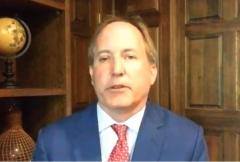
Texas Atty. Gen. Ken Paxton
(Screenshot)
Texas is leading a coalition looking into the vast, and potentially monopolistic, power and influence of Facebook and Google, the state’s Attorney General Ken Paxton announced Thursday.
Paxton made the revelation while speaking at a Zoom videoforum discussing the conservative movement’s free-speech concerns about Facebook’s new, liberal-dominated, global oversight board charged with overseeing content removal and disputes. Paxton was joined by fellow speakers Sen. Marsha Blackburn (R-Tenn.), First Liberty Institute President Kelly Shackelford, and moderator Brent Bozell, president of the Media Research Center, which hosted the event.
The initial focus of the investigation is to “follow the money,” Paxton said:
“I’m actually in the middle of an investigation of Facebook and Google. Several years ago, we became concerned about the potential monopolistic power of some of these technology companies.
“And, one of the things I learned a long time ago in business school when I was at Baylor University is: follow the money. And, so, that’s what we’re doing. We’re more than focused on Texas; we’re leading a 51-state coalition – which includes some territories – investigating Google.
“We’ve been doing that since the Fall. We were, really started part of that. We’re also involved in the investigation of Facebook, which also started, pretty much, the same time.”
Paxton said the coalition shares the fears voiced by the nation’s Founders: too much power in the hands of too few. And, while their investigation is currently trying to follow the money, it is also worried about content-control gives technology giants like Facebook vast power to influence consumer behavior, such as what they buy and how they vote.
Google, for example, has “seven thousand data points on just about every human being alive,” which it uses to “affect your decision-making in so many ways that, I think, a lot of people aren’t aware of,” Paxton said:
“Our focus has been, somewhat, narrow because we’re trying to follow the money first. That doesn’t mean we don’t have issues about content and how people are, potentially, censor victims, or police systems.
“It doesn’t mean we don’t have concerns about privacy, because we know that, we think Google has seven thousand data points on just about every human being alive – they know more about you than you do – and they use artificial intelligence to market in ways that are very seductive, whether that’s related to what you buy, to how you vote.
“They affect your decision-making in so many ways that, I think, a lot of people aren’t aware of.
“Our focus has really been on the anti-trust, because that’s where they make their money. As an example, Google has control of advertising on the Internet. They make over a hundred billion dollars a year on the Internet on advertising. They control the buy-side, the sell-side, and the market – which we are concerned gives them way too much power.”
Facebook operates in much the same way, which is why both Democrats and Republicans alike are joining concerned about the way the social media behemoth is wielding its using its immense power, Paxton said:
“And, there’s no doubt that Facebook controls their part of the world, as well. And, so, we’re looking at those issues and trying to figure out how we address them, as states. But, it tells you: you have this many states, this type of coalition, both Democrats and Republicans are concerned about the power that these technologies have – and whether that power is being used in an inappropriate way. So, that’s what we’re looking at.”







